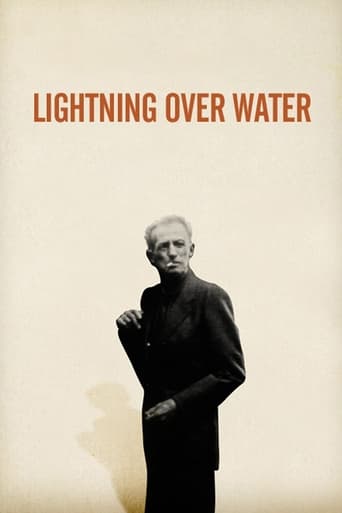
Director 'Nicholas Ray' is eager to complete a final film before his imminent death from cancer. Wim Wenders is working on his own film Hammett (1983) in Hollywood, but flies to New York to help Ray realize his final wish. Ray's original intent is to make a fiction film about a dying painter who sails to China to find a cure for his disease. He and Wenders discuss this idea, but it is obviously unrealistic given Ray's state of health.
Reviews
Thanks for the memories!
not horrible nor great
A Surprisingly Unforgettable Movie!
n my opinion it was a great movie with some interesting elements, even though having some plot holes and the ending probably was just too messy and crammed together, but still fun to watch and not your casual movie that is similar to all other ones.
Neither of the two protagonists in this pseudo documentary were served well here - Wem Wender and Nicholas Ray but shame particularly on Wender who was filming the last few months of Ray's life.Surely there was more to Mr. Ray than what was portrayed here? Could he not have had him commenting more on his vast body of work, his marriages, his children?It all felt highly exploitive and downright contrived but perhaps Mr. Ray had put restraints on Mr. Wender's access to his thoughts and feelings.But all I'm taking away from this is the nightmarish chain-smoking of Mr. Ray (everywhere, hospitals, Vassar, cabs - yeah it was 1979!) and the endless, hacking, breath-gulping, rasping sounds of his coughing from lung cancer.1 out of 10. To see a wonderful documentary on death and dying watch "Dying at Grace".
Halfway through the movie, I told my girlfriend who wasn't watching it, "this movie could be called 'Watch Nick Ray smoke'". What is this movie about? That's the question, which is the subject of this movie. One man, the legendary Hollywood director Nick Ray, is dying and the other, up-and-coming German director Wim Wenders, is trying to help him make a movie. They can't seem to figure out what the movie should be about. Ray thinks it should be about an elderly painter, unable to recapture past success, who robs his masterpieces from museums and replaces them with his own forgeries. The artist has a wife who is 40 years younger than he is, and he's dying from cancer. Wenders urges him to drop the fictional facade, since the character is obviously Nick Ray himself. Watching it, we're not sure if Ray and Wenders are genuinely disagreeing about the film's subject, or if this is all scripted and actually the film itself.And so the subject of the film is the idea of the fictional barrier or the artist's personal incentive and responsibility towards the art. It's a great statement about Ray's method of work as a director, the impulsive nature of it and his great insight into working with what he calls the "high caliber" talents of Hollywood, and we can't really disagree with him seeing the names -- Bogart, Mitchum, Dean. Ray offers that the personal investment and connection of the actor to the character and the situation is what anchors the performance and makes it great. In a standard narrative film, the separation between the actor and his/her role could thus be seen as even more the trick than it first appears to be, and much on the same order of trickery as this film itself, with its obvious "documentary" overtures and its real documentary value existing in an uneasy middle ground. As we watch Nick Ray basically die before the camera, Wenders offers that the merciless eye of the camera may capture more of the process of disintegration than the eye itself. That's what makes watching this film such a sad experience, particularly for myself and others who are fans of Ray but I'm sure for Ray's family in a totally different way, and for those who might never have heard of him in yet another way.Wenders' film touches upon very big questions and feels like it's getting closer to some very vital territory, but it never really takes off and soars. There's no moment of clarity or consciousness. Instead the very lack of clarity becomes the subject of the film even to its conclusion with a (probably faked) confrontation between the crew with some urging to burn (Ray's?) boat so that it would provide a fitting climax for the film. Ray wanted to make a film about self-examination, but Wender's "Lightning Over Water" ends up feeling like a sad and perversely voyeuristic experience with plenty of self-examination and no self-realization. I have to say that it sobered me up quite a bit, and it's quite an experience of a film for me, but I'm dubious about whether it's really the film that Ray and Wenders hoped that they were making.
In 1977,Nicholas Ray was part of the cast of "der Amerikanische Freund" as Derwatt,a painter who made forgeries .In this movie,Ray tells the story of a painter who steals the masterpieces in the museums and replaces them with forgeries.I have always been a Ray fan from "they live by night" to "run for cover" to "party girl" to his final epics which were looked upon by pretty much as failures.I must admit that I do not go much for Wenders' stuff ,which is much too intellectual for me .Its not a documentary movie,it's cinema verite depicting a man who is dying.The courage the director displays in front of death commands admiration but I wonder whether this movie should have been released:it's an intimate one,which should have been reserved for the circle of family and close friends.And I'm sure that many of these prefer to keep a picture of a healthy man .If you have seen four or five movies by Ray ("rebel without a cause" "Johnny Guitar" "The savage" ) a piece of advice:try and see the lesser known Ray works:"wind across the everglades "born to be bad" "on dangerous ground" or "knock on any door" .The best homage to an exceptionally gifted director.There are two good moments in "Lightning over water":The "lusty men" extract happens to be my favorite in this classic:Mitchum come s back home,an old house where he finds back a comic and a money box:In "Lightning " ,Ray hints at "coming back home,seeing my mother's face" Childhood was an obsession in his work :just remember Dean playing in the gutter ("Rebel) or Cagney trying to make Derek his "son" in "run for cover" .THe diary which Wenders reads is in German which makes sense since it's his first language;the shots of the wings of the plane are fascinating.
Two video versions of this film exist, both roughly the same length. The first was released by Pacific Video on VHS in 1987, the second just this month (1/03) by Anchor Bay on DVD. According to Kathe Geist's book "The Cinema of Wim Wenders: From Paris France to Paris Texas," Wenders was so depressed by the filming of "Lightning" and Ray's death that he handed the footage over to his editor, Peter Przygodda, who spent a year fashioning it into a version shown at Cannes; apparently this is also the version released by Pacific Video in 1987 and which I first saw around that time (and have watched many times since). Wenders supposedly found this version obscure and depressing and re-edited, adding a voiceover (his own) and superimposing passages from Ray's diary; this is the version just released on DVD, and is considered by some the definitive edition. But I find Wender's criticism of the initial cut confusing, for it's the LATTER cut (his own) which is murky and depressing. Nick Ray's final scene, for example ("Cut...Don't Cut.") is tortuous (we're watching a man dying), and there are sequences edited so bizarrely as to be almost incomprehensible. The first cut, in contrast, has a narrative flow and progression that make it easier to absorb, though it's still tough going as we witness Nick Ray's suffering. Also, Wender's narration in the 2nd version (absent in the initial cut) actually adds little to the film. The first version is unfortunately out of print but is worth tracking down because it's the superior one.
Top Streaming Movies
















